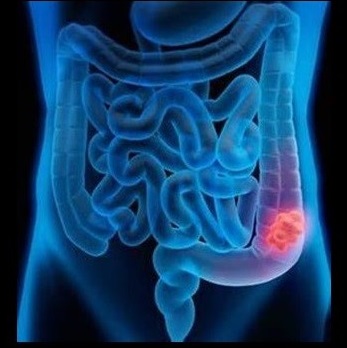Colon cancer rates and deaths are rising among younger Americans, study says.
- Are there lessons to learn for Africans?

Image showing a common site for the location of colon cancer in humans.
"You just have to be cognizant that colorectal cancer is not an old person's disease anymore. It's a middle-aged people's disease now. And it seems not enough people are getting screened." – says a US cancer specialist.
A recent report from a population review of the burden and trends of colon cancer in the United States has observed that as of 2019, 20% of colon cancer cases occurred in adults under age 55 -- up from just 11% in 1995 and that younger Americans are being diagnosed with advanced stages of the disease (60% in 2019, up from 52% in the mid-2000s).
These observations are baffling cancer experts especially since the number of colon cancer cases are declining in the overall population.
According to Dr. Ahmedin Jemal, Senior Vice President for Surveillance and Health Equity science at the American Cancer Society (ACS), not much is known despite on-going research about the drivers of the rapid increase in colorectal cancer among young Americans.
Proposed factors include:
Researchers indicate that in 2023, more than 153,000 Americans will be diagnosed with colon cancer and 52,550 will die from the disease.
As screening is the best protection against colon cancer, the ACS recommends that screening starts at age 45 for people at average risk.
Jemal said that although only 4 in 10 adults are being screened, he does not anticipate the recommended age for screening will be dropped lower because younger people are being seen with the disease.
"If we were to raise colorectal cancer screening up to 80%, we estimated tens of thousands of cases could be averted, and thousands of lives could be saved," said Dr. Jemal.
A family history of colonic polyps – which are believed to be precursors of colon cancer plus changes in bowel habits and bleeding -- symptoms of colon cancer -- are reasons to speak with your doctor regarding screening for colon cancer.
Doctors need to recommend screening and patients need to be proactive and ask their doctor about screening.
For the report, Jemal's team used data available through 2019 from 50 states and the District of Columbia from the U.S. National Cancer Institute and the U.S. Centers for Disease Control and Prevention.
They found that incidence of colon cancer and related deaths declined from 3%-4% a year during the early 2000s to 1% a year and 2% a year respectively, in the past decade.
Colon cancer rates were 33% higher in men (41.5 per 100,000) than in women (31 per 100,000) from 2015 to 2019, likely due to differences in risk factors, such as excess body weight, eating processed meats and smoking, the researchers noted.
Rates of colon cancer have declined for those 65 and older and have stabilized for people 50 to 64, but have increased by 2% yearly in people younger than 50 and those 50 to 54.
Moreover, deaths from colon cancer have increased since about 2005 by 1% a year in people younger than 50 and by nearly 1% in people 50 to 54, the researchers say.
The highest rates of colon cancer are among Alaska Natives (88.5 per 100,000), American Indians (46 per 100,000) and Black people (41.7 per 100,000). Among white people, incidence is 35.7 per 100,000. Death patterns are similar, with the highest among Alaska Natives, American Indians and Black people.
The report was published online March 1 in CA: A Cancer Journal for Clinicians.
Click here for a comparative fact-sheet on Colon cancer in Africa.
Just like in the United States, the rates of new cases, deaths and Disability Adjusted Life Years (DALY) for CRC have been observed to be on the upward trend for both males and females across Africa in recent years. More region specific research and public awareness raising are needed to inform the design of population health interventions for the reversal of the uptick in the trends of the condition and to encourage early screening of younger Africans probably from age 40 or 45 years and above.
Sources:
Siegel, R.L., Wagle, N.S., Cercek, A., Smith. R.A., Jemal, A.: Colorectal cancer statistics 2023. CA: A Cancer Journal for Clinicians, Published online, March 1, 2023. https://doi.org/10.3322/caac.21772
Irabor, D.O.: Colorectal carcinoma: Why is there a lower incidence in Nigerians when compared to Caucasians? Journal of Cancer Epidemiology, Volume 2011, Article ID 675154, doi:10.1155/2011/675154
Awedew, A.F., Asefa, Z. & Belay, W.B. Burden and trend of colorectal cancer in 54 countries of Africa 2010–2019: A systematic examination for Global Burden of Disease. BMC Gastroenterol 22, 204 (2022). https://doi.org/10.1186/s12876-022-02275-0
Related:
Colon cancer: Symptoms, Causes, Diagnosis and More
Published: March 5, 2023
© 2023. Datelinehealth Africa Inc. All rights reserved.
Permission is given to freely copy, use and share content subject to attribution as to source.
DATELINEHEALTH AFRICA INC., is a digital publisher for informational and educational purposes and does not offer personal medical care and advice. If you have a medical problem needing routine or emergency attention, call your doctor or local emergency services immediately, or visit the nearest emergency room or the nearest hospital. You should consult your professional healthcare provider before starting any nutrition, diet, exercise, fitness, medical or wellness program mentioned or referenced in the DatelinehealthAfrica website. Click here for more disclaimer notice.